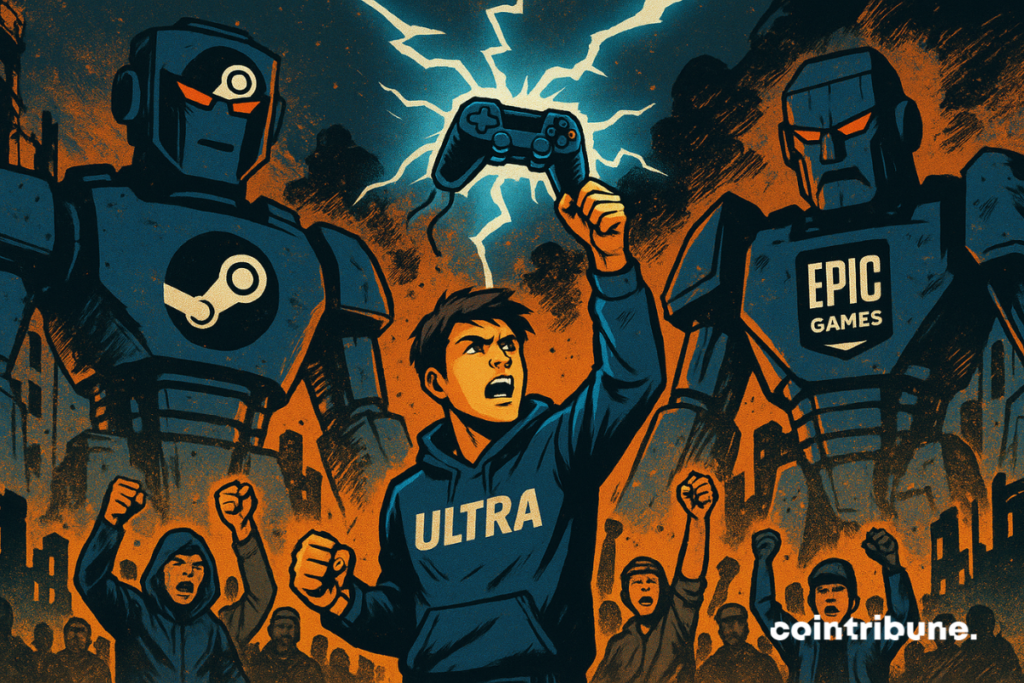Ultra vs The Giants: Why the Future of Gaming Won’t Happen on Steam
The old guard built walled gardens. Ultra is tearing them down. Today, gamers juggle launchers, subscriptions, and fragmented digital economies. But what if one platform could simplify everything and put players back in control?

In Brief
- Ultra gives players actual digital ownership.
- Lower fees and better tools for developers and creators.
- A unified Web3 platform built for real use, not speculation.
The heavyweights in the game
For over a decade, Steam has dominated the landscape with more than 120 million monthly active users, Epic follows with its blockbuster. GOG, Battle.net, and others round out a Web2 ecosystem where games are a service… but rarely something you actually own and where game developers are not always paid what they’re really worth.
On the Web3 gaming side, challengers are multiplying: Gala Games, Elixir, and HyperPlay are all trying to merge gameplay with digital ownership, but results have been inconsistent…
Sitting at the crossroads of these two worlds, Ultra stands apart.
Ultra vs Steam, Epic, and the Rest
As the giants of PC gaming impose their own – often rigid – rules, Ultra offers a new kind of experience. They break the mold by focusing on true ownership for users, and offering developers flexible and built-in tools.
Steam treats games like files. We give you power.
Rod Oliveira, CMO at Ultra
Ultra is tearing down the old model, giving players ownership, developers freedom, and everyone a fairer deal. In this ecosystem, you can trade, reward, and earn across every game.
Catalog & curation
For now, Steam still leads in volume, with tens of thousands of titles but often at the expense of quality control. Epic bets on exclusivity and keeps a tighter, curated catalog. Ultra goes a step further by focusing on quality and care. Its catalog features handpicked indie, AA, and soon AAA titles like the upcoming exclusive Citadels. More than a store, Ultra delivers a refined, human-scale experience where games benefit from built-in marketing, analytics, funding tools, and native Web3 features.
It’s not just a platform. It’s a next-gen ecosystem built around developers and their games.
Revenue sharing
Steam takes 30 percent. Ultra takes 15 percent, sometimes even less for closely integrated studios. But Ultra goes beyond percentages. With built-in co-marketing, analytics, and funding support, it’s a real partner.
Platforms need to earn their cut. Thirty percent doesn’t make sense anymore.
Creator & social tools
While Steam relies on community contributions like the Steam Workshop, Ultra natively integrates tournaments with rewards, collectibles marketplace, and affiliate programs directly in its launcher. Everything is native and streamlined.
Digital ownership & resale
Here, Ultra is far ahead. Steam and Epic lock your purchases and forbid resale of games or digital items. Ultra, leveraging non-speculative NFTs, delivers true ownership of digital assets and allows players to own, sell and trade their assets (games, skins, items… it’s all yours)..
You don’t rent your skins. You own them.
Tech & performance
Ultra’s launcher competes with the best: fast installations, smooth updates, gas-free experience, and cross-game interoperability. Thanks to the Ultra EVM and its native token $UOS, users navigate a cohesive, fluid ecosystem built for use, not speculation.
Case study: Empires – More than a game, a world to own
Empires isn’t just a game. It’s the engine behind the war. As the meta-strategy layer of the FPS game Citadels, it lets players mine resources, research advanced tech, and build digital infrastructure that matters. Every blueprint, every trade, every decision shapes the world and the surrounding market.
Powered by Ultra’s blockchain, Empires is where players mine resources, research breakthroughs, and take control of entire supply chains. Every action directly impacts Citadels. This isn’t passive progression. It’s meaningful engagement designed to retain players and drive value.
For studios: more than a storefront, a full gaming OS
Ultra is more than a game host. It’s a full-stack gaming OS. Devs get analytics, open APIs, multi-channel monetization, and cross-game promotion. It’s a dream come true for indie or AA studios seeking autonomy and visibility.
Ultra: A better experience
Ultra isn’t a store. It’s the operating system for the future of play. The gaming platform powers everything from launchers and leaderboards to NFTs, wallets, and tournaments. One login. One wallet. One ecosystem where everything comes together.
Far from empty hype or crypto buzzwords, Ultra delivers a forward-looking vision grounded in real use: rewarding engagement, smoothing the gaming economy, and putting players back at the center, bolstered by its recent $12 million funding round and the launch of an ambitious roadmap.
Try Ultra or follow their roadmap at ultra.io and @Ultra_io. The future of gaming might not play out on Steam.
Maximize your Cointribune experience with our "Read to Earn" program! For every article you read, earn points and access exclusive rewards. Sign up now and start earning benefits.
The Cointribune editorial team unites its voices to address topics related to cryptocurrencies, investment, the metaverse, and NFTs, while striving to answer your questions as best as possible.
The contents and products mentioned on this page are in no way approved by Cointribune and should not be interpreted as falling under its responsibility.
Cointribune strives to communicate all useful information to readers, but cannot guarantee its accuracy and completeness. We invite readers to do their research before taking any action related to the company and to take full responsibility for their decisions. This article should not be considered as investment advice, an offer, or an invitation to purchase any products or services.
Investment in digital financial assets carries risks.
Read more